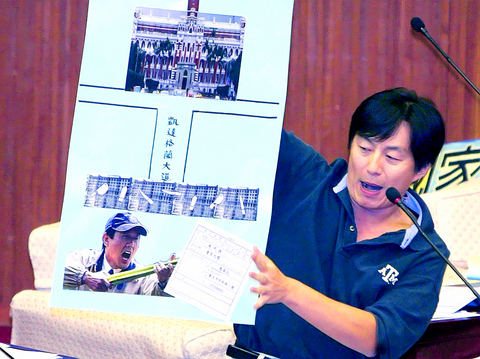CNA, with Staff Writer
The group sponsoring a campaign to depose President Chen Shui-bian (
Ho Teh-fen (賀德芬), spokeswoman for the anti-Chen Shui-bian campaign launched by former Democratic Progressive Party chairman Shih Ming-teh (施明德) condemned former DPP legislator Lin Cheng-chieh's (林正杰) attack on Contemporary Monthly editor-in-chief Chin Heng-wei (金恆煒) during the Formosa Television talk show The People Talk on Thursday night, saying that the "Depose Chen" group deplores any kind of violence.

PHOTO: CNA
Ho said Lin was not a staff member at the campaign headquarters and that his act of violence had nothing to do with the campaign. She said that he will be barred from the sit-in, scheduled to be launched in front of the Presidential Office at the start of next month.
According to Ho, Lin suggested that a team of bodyguards be organized to protect Shih during and before the sit-in. Ho added that Lin's suggestion was immediately rejected by the campaign's organizers.
"We condemn any act of violence. Any individual intending to take part in the sit-in protest must abide by our rules and discipline. We have stepped up personnel training to maintain order and discipline at the sit-in site after the protest begins early next month," Ho said.
Shih's camp yesterday also issued guidelines for its upcoming sit-in campaign next month. The exact date on which the sit-in will start has yet to be finalized by the group.
The guidelines stated that all participants must maintain a friendly attitude at all times; must show sympathy and compassion toward government officials or those who are against the rally and must not challenge government officials or those who are against the rally so unnecessary arguments or conflicts can be avoided.
The guidelines also asks participants not to fight back if they are attacked or challenged; not to carry any weapons or any items that could be used as weapons, follow the leadership and withdraw from the rally if they do not agree with the leaders.
Participants must not resist law enforcement officers unless fellow participants are humiliated or their human rights are invaded, the guidelines said.
"The leader [of the sit-in event] will only be replaced if an accident happens, such as being arrested, assassinated or so on," said Ho, adding that there will be a second-in-command who will take over should that happen.
Along with the guidelines, participants must also sign a card with a vow on it to promise that they will not be involved in any violence but will only deliver a message from the public to recall the president.
"It will simply be a democratic activity. We hereby refuse anybody who is planning to take advantage of the activity to deliver any private messages that do not concern our request to recall the president," Ho said.

A Taiwanese software developer has created a generative artificial intelligence (AI) model to help people use AI without exposing sensitive data, project head Huang Chung-hsiao (黃崇校) said yesterday. Huang, a 55-year-old coder leading a US-based team, said that concerns over data privacy and security in popular generative AIs such as ChatGPT and DeepSeek motivated him to develop a personal AI assistant named “Mei.” One of the biggest security flaws with cloud-based algorithms is that users are required to hand over personal information to access the service, giving developers the opportunity to mine user data, he said. For this reason, many government agencies and

The National Fire Agency on Thursday said a series of drills simulating a magnitude 8.5 earthquake would be held in September to enhance the government’s emergency response capabilities. Since earthquakes cannot be predicted, only by continuously promoting disaster prevention measures could Taiwan enhance its resilience to earthquakes, agency Director-General Hsiao Huan-chang (蕭煥章) said in a news release. The exercises would be held to mark annual National Disaster Prevention Day on Sept. 21, the aim of which is to test Taiwan’s preparedness and improve its earthquake resilience in case of a major temblor, Hsiao said. As part of those drills, an earthquake alert would

DEFENSE: The National Security Bureau promised to expand communication and intelligence cooperation with global partners and enhance its strategic analytical skills China has not only increased military exercises and “gray zone” tactics against Taiwan this year, but also continues to recruit military personnel for espionage, the National Security Bureau (NSB) said yesterday in a report to the Legislative Yuan. The bureau submitted the report ahead of NSB Director-General Tsai Ming-yen’s (蔡明彥) appearance before the Foreign and National Defense Committee today. Last year, the Chinese People’s Liberation Army (PLA) conducted “Joint Sword-2024A and B” military exercises targeting Taiwan and carried out 40 combat readiness patrols, the bureau said. In addition, Chinese military aircraft entered Taiwan’s airspace 3,070 times last year, up about

STRICTER ENFORCEMENT: Taipei authorities warned against drunk cycling after a sharp rise in riding under the influence, urging greater public awareness of its illegality Taipei authorities have issued a public warning urging people not to ride bicycles after consuming alcohol, following a sharp rise in riding under the influence (DUI) cases involving bicycles. Five hundred and seven people were charged with DUI last year while riding YouBikes, personal bicycles, or other self-propelled two-wheelers — a fourfold increase from the previous year, data released by the Taipei Police Department’s Traffic Division showed. Of these, 33 cases were considered severe enough to be prosecuted under “offenses against public safety,” the data showed. Under the Road Traffic Management and Penalty Act (道路交通管理處罰條例), bicycles — including YouBikes and other